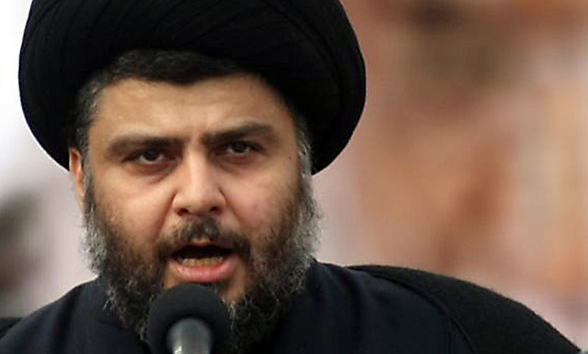Muqtada Al-Sadr is an Iraqi religious and political leader. He is also a militia commander and is head of the Mahdi Army. He is strongly opposed to America’s presence in his country but has stuck to a 2005 truce, which has seen levels of violence decrease. Sadr is currently studying to be an ayatollah and is still very popular with millions of Iraqis.
穆克塔達·薩德爾是伊拉克宗教和政界領(lǐng)袖。他還是“救世主軍”領(lǐng)袖。薩德爾強烈反對在伊美軍,但恪守2005年停戰(zhàn)協(xié)定,此舉也緩解了暴力沖突。如今,薩德爾正在努力成為一名什葉派阿亞圖拉,并受到數(shù)百萬伊拉克人民的厚愛。
Sadr is the fourth son of the late Grand Ayatollah Mohammad Sadeq Al-Sadr, a famous Shi‘a(chǎn) cleric. As a child, Muqtada attended a religious seminary but did not finish his education. After his father's assassination, he took over the charity and social work his father had controlled. He immediately became very popular with his Shi’a followers.
薩德爾是大阿亞圖拉老薩德爾的第四個兒子,“阿亞圖拉”為什葉派牧師。孩童時期,薩德爾進入神學(xué)院學(xué)習(xí),但未能完成學(xué)業(yè)。父親遇刺后,小薩德爾接替父親的慈善和社會工作。隨即獲得什葉派上下的擁戴。

In 2003, the US-led coalition set up the Coalition Provisional Authority and Iraqi Governing Council (IGC). Sadr decided to enter the political stage. He stated that he had more right to govern Iraq than the IGC. He formed his own shadow government. Since 2003, his Mahdi army has provided many important social services to the people of Sadr City in Baghdad.
2003年,美國主導(dǎo)聯(lián)軍設(shè)立美英臨時管委會和伊拉克管理委員會。小薩德爾決定走入政壇。據(jù)他所說,比起伊拉克管理委員會,他對管理伊拉克擁有更多權(quán)力。并隨即建立影子政府。自2003年起,他的“救世主軍”向巴格達的薩德城居民提供了大量援助。
In 2004, Sadr's Mahdi Army demonstrated against the closure of Sadr’s newspaper and took over several key positions in Baghdad. After calling a truce, he told his soldiers to "do their duty" and go home. He boycotted the 2005 Iraqi election, saying it was a fraud. In 2007, Sadr went into exile in Iran. He continues to tell Iraqi soldiers and police not to work with American forces.
2004年,“救世主軍”就關(guān)閉薩德城新聞社舉行游行示威活動,并占領(lǐng)巴格達多處主要陣地。停火簽訂后,他要求士兵解甲歸田。薩德爾抵制2005年伊拉克大選,并稱之為騙局。2007年,薩德爾流亡伊朗。對于伊拉克士兵和警察武裝,他仍告誡他們不要與美軍合作。
譯文屬可可英語原創(chuàng),未經(jīng)允許,不得轉(zhuǎn)載。











